Richard Hickox was lost to us at the early age of sixty (obituary).
After launching as a choral conductor with EMI (some fine Delius
and Rubbra),
Decca (also Delius)
and RCA (Rubbra
masses) in the mid/late 1970s he worked with Chandos for many
years. It was that label that remained his recording
alma mater. He made numerous recordings with them -
many but not all of them of English music. There was Prokofiev’s
War
and Peace, some opulent Menotti (review)
and plenty of early music.
If not incomparable, Hickox’s musical range of coverage and
empathy was and remains breathtaking. His Chandos legacy vies
with those who died at a much later age with a longer recording
career including Boult, Thomson and Handley. He had his blind
spots – who does not? There was no Foulds or Bantock from him
and the Bax symphonies appear to have been a closed book. Mind
you, listening again to one of his broadcasts of Bax’s Overture
to a Picaresque Comedy his heart was clearly not in the
Baxian idiom. These composers were in any event well catered
for by others. His coverage was stupendous and Chandos have
it all. On song, which he was with so many composers including
Bridge, Elgar, RVW, Howells, Holst and Dyson, his recordings
live and breathe the freshness of personal discovery. I hope
that most of his sessions will appear in this typically handsomely
done Chandos series.
All the CDs in the Legacy series are to a standard livery. This
sets the original sleeve in the milieu of the Legacy medallion
and a sombre ground. The Dyson is the exception though the medallion
is still there.
Let’s now turn to these discs:-
TAVENER
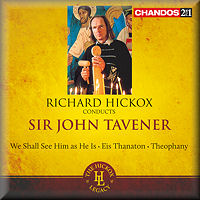 This
was the first in the Hickox Legacy series from Chandos and was
an outlier issued in splendid isolation in May 2012.
This
was the first in the Hickox Legacy series from Chandos and was
an outlier issued in splendid isolation in May 2012.
Here we find three works of spiritual moment and numinous atmosphere
– qualities that are a given with Tavener.
There are thirteen sections making up We Shall See Him
As He Is. The work was commissioned in 1990 by the
now-dismembered Cheshire County Council for the 900th anniversary
of Chester Cathedral. Reverential mystery is the key with oriental
ornamentation much in play in the voices. The music is unhurried,
slow and avidly devotional. Ikons III and IX defy this
sweeping generalisation with dervish wildness and Hovhaness-style
heavenly dancing. In Ikon X a majestic stance is struck by the
brass while the choir are borne aloft as if on some great upward-combing
wave. There’s an ululating muezzin tone to the solo and choral
singing; it feels North African - Berber even. The cello assumes
a cantorial role and this can be sampled in Ikon X. The text
was compiled by Tavener's spiritual mentor, Mother Thekla
of the Orthodox Monastery, Normanby, North Yorkshire. The piece
ends with those whisper-sweeping violin figures reminiscent
of Hovhaness's writing in Fra Angelico.
Eis Thanaton (Ode to Death) opens in a growlingly
minatory mood. This work was borne out of the death of Tavener's
mother. His musical voice was stilled by bereavement for two
months when he read the eponymous poem by Andreas Kalvos musical
ideas began to float free. North African melisma is again engaged
across a three movement trajectory that spans some 39 minutes.
The journey is from darkness to life. Cathedral spaces are evoked
and blended with the sort of vocalise one finds in RVW's
Sinfonia Antartica. A more vigorous and grimly joyous
atmosphere settles over the last movement with the growlingly
passionate voice of Stephen Richardson memorably grainy and
grippingly Old Testament.
Theophany is for pre-recorded tape and orchestra.
It's in two meaty segments. The music hums and rumbles
with deeply intoned bass voices. The effect is rather like a
sort of exoticised Tallis Fantasia combined with the
lowest plumbing depths of Rachmaninov's Vespers.
Various instruments are added to the standard orchestral forces:
apart from the bass voice and Chinese wind-gong there’s the
pre-recorded tape continuously playing, alto flute and Bandor
drum. This was written for the Bournemouth Symphony Orchestra's
centenary.
These two discs - here complete with words printed in the booklet
- were first issued separately in the first half of the 1990s.
They complement a more recent Chandos disc, again Hickox conducting,
of Tavener's Fall and Resurrection on CHAN
9800.
BRIDGE boxed set
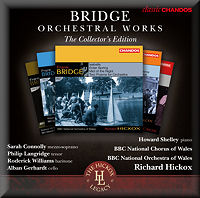 The
six Frank
Bridge discs appeared one at a time in an unhurried way.
We can now encounter all six in this single superbly finished
box: the single Bridge collection.
The
six Frank
Bridge discs appeared one at a time in an unhurried way.
We can now encounter all six in this single superbly finished
box: the single Bridge collection.
It includes an elementally remorseless Enter Spring
– confident, transparent and wondrously recorded. The
luxuriant Jefferies Poems are superb and terribly
undervalued. The early Mid of the Night is an
extended tone-poem in the same Tchaikovskian mould as Bridge’s
Isabella. The Dance Rhapsody is an
eruptive and dionysiac extravaganza while the Dance Poem
stands closer to the chill of There is a Willow though
broadly contemporaneous with the idyllic Summer. The
Sea, a work that, with Enter Spring, bowled
over the young Britten, is lucidly textured yet avoids the wash
and swell of impressionism. Bridge paints in broad swathes of
melody. This is a remarkably fine performance.
We also hear the snappy pomp of the Coronation March
alongside the George Butterworth and Ravel of Summer.
Then come the first stirrings of Continental accents in There
is a Willow until we move onwards into the masterly
ambivalence and mildewed expressionist complexity of Phantasm.
From his uncompromising older age comes Oration:
Alban Gerhardt’s cello basks in a recording perspective that
is spectacular, probably the best it has ever had. The solo
is given a microphone eminence which is extremely commanding,
exciting, flamboyant and gratingly moving. That epilogue is
deeply affecting, tender through the soloist's voice,
yet bleakly haunted like the second movement of Havergal Brian's
Gothic. The 1940-41 Allegro moderato
for string orchestra is all that remains of a projected symphony
for strings. It is classically clean and very romantic when
you compare it with the bustle and elfin dissonance of Rebus.
The 1915 Lament is warm but there are harmonic
eddies and depths that look forward by at least a decade. A
Prayer, to words by Thomas ŕ Kempis takes us down a
road Bridge did not go down again except, to some extent, in
the opera A Christmas Rose (on Pearl). It is Bridge's
only work for chorus and orchestra and is an invocation to peace.
Rebus: Apart from some inimical shadows
and an occasionally ruthless tread this is a bustling, determined
and romantic little concert overture with Elgarian and even
Waltonian moments.
The Suite for Strings is an early work and very
much of the same stamp as Sir Roger de Coverley. Wit,
excitement and beguiling enchantment are all there. How did
Bridge remain so many years in the outer darkness? From 1902,
The Hag is a macabre nightmare - a howling gale,
reeking of brimstone. The two songs of Robert Bridges were recorded
first by Pearl in their occasional SHE series. This is luxuriant
writing with a Delian temperament. The orchestra returns for
the Delian Two Intermezzi from Threads.
The Valse Intermezzo is an early piece.
It is smoothly contoured: sweet and light. To end Hickox unleashes
the wit and rapier flicker of Sir Roger.
We also hear premiere recordings of nine songs for solo voice
with orchestra. Five are for tenor (Langridge) and four for
mezzo (Connolly). These are superbly orchestrated – bejewelled
in their detailing. They stand little chance of any concert
life - at least not in this format; this despite often having
a big Mahlerian heart and a gentle gift. Berceuse
is a heart-open genre piece. The Pageant of London
is for wind band: not of his best: something of a pot-boiler.
The exemplary Bridge notes are by Paul Hindmarsh.
Links to reviews of original releases: http://www.musicweb-international.com/classrev/2010/Nov10/Bridge_Hickox.htm
Link to Bridge biography: http://www.musicweb-international.com/bridge/index.htm
RALPH VAUGHAN WWILLIAMS A Cotswold
Romance
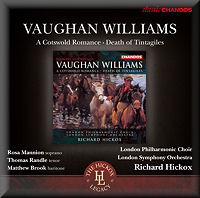 A
Cotswold Romance (first
reviewed here in 1999) gives some of the finest music in
RVW's opera Hugh The Drover an opportunity to
thrive as a concert work. Its constituency remains that of the
choral society. It runs to about the length of a symphony. It
was a clever move for composer Maurice Jacobson - how long before
we have a recording of his grievously missed Hound of Heaven
- to collaborate with composer. A parallel can be found in the
work the composer put into In Windsor Forest which
served the same purpose for the opera Sir John in Love
(EMI).
These secular cantatas fit rather well with the much larger
Dyson Canterbury Pilgrims, RVW's own Five
Tudor Portraits and Hadley's The Hills.
As a group they form a counterpart to RVW's religiously-inclined
works such as Benedicite, Dona Nobis Pacem
and Hodie.
A
Cotswold Romance (first
reviewed here in 1999) gives some of the finest music in
RVW's opera Hugh The Drover an opportunity to
thrive as a concert work. Its constituency remains that of the
choral society. It runs to about the length of a symphony. It
was a clever move for composer Maurice Jacobson - how long before
we have a recording of his grievously missed Hound of Heaven
- to collaborate with composer. A parallel can be found in the
work the composer put into In Windsor Forest which
served the same purpose for the opera Sir John in Love
(EMI).
These secular cantatas fit rather well with the much larger
Dyson Canterbury Pilgrims, RVW's own Five
Tudor Portraits and Hadley's The Hills.
As a group they form a counterpart to RVW's religiously-inclined
works such as Benedicite, Dona Nobis Pacem
and Hodie.
The Romance is in ten separately tracked segments starting
with The Men of Cotsall which, with its market cries,
pre-echoes Pilgrim's Vanity Fair. The ardent
song by Hugh is nicely taken by Thomas Randle with passionate,
almost Delian, interplay with the choir in Hugh's
Song of the Road. A Stanfordian stamp can be discerned
here - echoes of the Songs of the Sea and also of the
vigorous songs from RVW’s own Stevenson Songs of Travel.
After a vigorous boxing bout song, continued in track 7, comes
a romantic strain in Alone and friendless. This was
a mood and idiom further developed in total mastery in the green
leaf ardour of Sir John in Love. Much the same applies
to Mary's solo in Mary's escape on tr.
9. I might fault Randle for sounding the same in lovelorn mood
and in misery in Hugh in the stocks but it’s a small
quibble. Randle and Mannion duet in Freedom at Last
where - with the chorus - happy endings are swooningly celebrated.
This is indeed an easily digestible epitome of the full opera.
You can hear the whole thing on EMI Classics and on Hyperion.
The composer revised Hugh from the original of 1910-14
in 1933 and 1956 but the full work lacks the grip of Sir
John not to mention the epic span of Pilgrim's
Progress. It even struggles beside the much derided but
deeply entertaining Poisoned Kiss (another Chandos
Hickox set) – a sort of echo of Holst's own irresistible
parody opera The Perfect Fool and a tradition which
continues to this day in Sondheim's Into the Woods.
The seven orchestral movements of RVW's incidental music
to Maeterlinck's play The Death of Tintagiles
date from 1914. Some of these are fey little vignettes, well
worth hearing and often coloured with melancholic pallor. They
are totally characteristic of the composer. Listen to the solo
viola on tr. 13 and the Norfolk morning mists of tr. 14. By
contrast there’s a ruthless anxiety about the music on tr. 16.
The words are printed in full and the notes by Stephen Connock
of the RVW Society are solidly informative.
HOLST Wandering Scholar
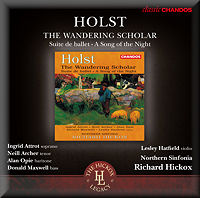 This
disc always had a shortish playing time but compensation comes
in the shape of a clever mix of rare Holst. What we get is a
snappy light orchestral suite in four movements, a scena for
violin and orchestra and a single act opera forming a medieval
counterbalance to the Spartan Indian opera Savitri.
This
disc always had a shortish playing time but compensation comes
in the shape of a clever mix of rare Holst. What we get is a
snappy light orchestral suite in four movements, a scena for
violin and orchestra and a single act opera forming a medieval
counterbalance to the Spartan Indian opera Savitri.
The Suite is a deft example of its type: good but not
fully characteristic Holst. It is jolly, suave in the second
movement, peacefully smiling in the third. There Bradley Creswick's
seamlessly engaging violin solo is not a big step away from
the Dvorákian contentment of Coleridge Taylor's violin
concerto as stunningly recorded by Lorraine McAslan on Lyrita.
The finale wakes up the sleeper with some muscular yet light-footed
writing for the brass benches. If it is more German and Ketčlbey
than the Holst we know it remains a delightful discovery. There's
even an oompah-galumphing dash of Mahler at one point.
Lesley Hatfield takes on A Song of the Night
and makes of it a thing of moody passion which the good notes
by Lewis Foreman link with Holst's interest in matters
Sanskrit. It's a lush piece and comfortably shares the
same genre as single movement efforts of this ilk by Dvorák,
Saint-Saens and Tchaikovsky. It also makes, presumably unknowing,
common cause with another delight I have discovered recently
- the Rozycki Violin Concerto (on Acte Préalable). Holst’s sumptuous
and chocolate-romantic music in this case is strong on such
qualities rather than on drama.
Then comes a violent change of gear with the compact little
opera The Wandering Scholar to words by Clifford
Bax. The milieu and words can be grouped with those of Howells'
Kent Yeoman's Wooing Song and RVW's Hugh
the Drover. This opera is wonderfully characterised and
given its best chance to shine. Its scale makes it a good match
with that other little charmer, Barber's metropolitan
A Hand of Bridge - though the latter is more knowing
and psychologically piquant as well as more dated. There’s a
faintly salacious story in which honest Louis, the farmer, whose
‘loose i’ the hilts’ wife is almost seduced by the roving priest
Philippe - playing out the lubricious capers of Falstaff in
Sir John In Love - whose predatory charms are frustrated
by the wandering scholar, Pierre. The words are in English only.
There are nine tracks so it’s easy to get around. We have a
really fine performance of a work that is witty-folksy and full
of intricate and intriguing instrumental detail. It’s very well
done. Roll on a full recording of Sita and The
Perfect Fool. All the words are there in the insert and
there are lots of them for a piece running 25 minutes.
HOWELLS Hymnus Paradisi
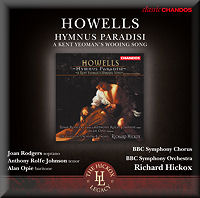 The
Howells disc complements the label's extravagant two
disc foray into Howells for soloists, choir and orchestra with
Rozhdestvensky: Stabat Mater and the explosively voluptuous
Missa Sabrinensis. There's a two
CD set of those two works which complements this Hickox
event very well indeed. Hickox takes things more philosophically
than both the classic Willcocks (EMI)
and Handley (Hyperion) in Hymnus. Chandos have a way
with big choral works as is evident from their Dyson
Quo
Vadis but also with their magnificent Schmidt
Book
of the Seven Seals. This reputational glow stands out in
the final section of Hymnus: Holy is the True Light.
The building of range and tension is felt in all its mastery
in the pizzicato ground bass at 3:24 of that track. The climactic
surge, when it comes, is irresistible yet sober in grandeur
at 4:43. Hickox remains in emotional control even at 5:28 in
tr. 6 when one gets an echo of A Mass of Life's
O du meine wille.
The
Howells disc complements the label's extravagant two
disc foray into Howells for soloists, choir and orchestra with
Rozhdestvensky: Stabat Mater and the explosively voluptuous
Missa Sabrinensis. There's a two
CD set of those two works which complements this Hickox
event very well indeed. Hickox takes things more philosophically
than both the classic Willcocks (EMI)
and Handley (Hyperion) in Hymnus. Chandos have a way
with big choral works as is evident from their Dyson
Quo
Vadis but also with their magnificent Schmidt
Book
of the Seven Seals. This reputational glow stands out in
the final section of Hymnus: Holy is the True Light.
The building of range and tension is felt in all its mastery
in the pizzicato ground bass at 3:24 of that track. The climactic
surge, when it comes, is irresistible yet sober in grandeur
at 4:43. Hickox remains in emotional control even at 5:28 in
tr. 6 when one gets an echo of A Mass of Life's
O du meine wille.
Hymnus Paradisi is at the heart of the English
choral tradition and, more to the point, much loved. It inhabits
realms of exultation and exaltation. It concentrates elements
from the first section of the Delius Mass of Life and
slightly further afield voices from Hilding Rosenberg's
Symphony No. 4 Johannes Uppenbarelse with its rapturously
pealing 'alleluias' forming their own echo of
Howells' Glory is the True Light.
After Hymnus we get A Kent Yeoman’s Wooing Song.
This is a secular cantata which was written in the 1930s but
not premiered until 1953. It is, in effect, an operatic scena
rife with vigour. The latter quality rattles through the second
movement: I Have a House and Land in Kent - words also
set in a song by Arnold Bax. It continues with final segment
I cannot come every day to woo. The more poetic third
section is sombrely ardent. There’s a Delian sigh about this
but this is diluted in the byplay between Ian Opie and the choir.
The whole work is very attractive and full of the sort of invigorating
life that holds tweeness at bay.
A bluff and bucolic voice irradiates A Kent Yeoman's
Wooing Song. Here the exemplars are Vaughan Williams's
Tunning of Elinor Rumming and My Pretty Bess
(Five Tudor Portraits) and the merry episodes from
Sir John in Love as well as the Wedding Scene
from Patrick Hadley's The Hills. The Willcocks
Hymnus on EMI Classics (CDM 5 67119 2) is strongly
paired with Boult's thunderously declamatory 1974 recording
of the Concerto for String Orchestra. The Kent
Yeomans's Wooing Song shows a fascinatingly extrovert
facet to Howells' genius.
All the words are printed alongside notes by Andrew Green.
ELGAR Light of Life
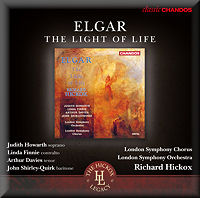 Light
of Life dates from early in Elgar's career and
was written in parallel with the secular cantata King Olaf.
The opening Meditation - which has been recorded as
a freestanding orchestral piece - is very good indeed. The story
treated is of Christ healing the blind man. There’s a nice tension
between Christ as Light of the World and the light He brought
to the blind man's eyes. Strength and majesty is unmistakable
in Light of world we know thy Praise. That said there
are also very effective passages touched with the static and
the meditative, the reflective and the pensive. John Shirley-Quirk
is in truly fine voice. There’s succulent work for the woodwind
throughout. This is a strong and very satisfying work lovingly
realised by Hickox, his strong solo team and excellent choir.
Light
of Life dates from early in Elgar's career and
was written in parallel with the secular cantata King Olaf.
The opening Meditation - which has been recorded as
a freestanding orchestral piece - is very good indeed. The story
treated is of Christ healing the blind man. There’s a nice tension
between Christ as Light of the World and the light He brought
to the blind man's eyes. Strength and majesty is unmistakable
in Light of world we know thy Praise. That said there
are also very effective passages touched with the static and
the meditative, the reflective and the pensive. John Shirley-Quirk
is in truly fine voice. There’s succulent work for the woodwind
throughout. This is a strong and very satisfying work lovingly
realised by Hickox, his strong solo team and excellent choir.
The notes are by Michael Kennedy - one cannot choose fairer
than that. The words are there in full in the booklet.
DYSON Canterbury
Pilgrims
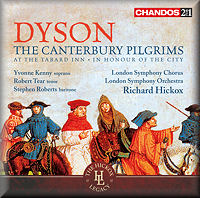 Pilgrims
runs to a freestanding concert prelude At the Tabard Inn.
There is then a Prologue and 12 character-pieces, one for each
tale.
Pilgrims
runs to a freestanding concert prelude At the Tabard Inn.
There is then a Prologue and 12 character-pieces, one for each
tale.
This two CD set, when first issued in the 1990s, was the answer
to many entreaties over a very long period. Choral societies
across England had never completely abandoned this vivid sequence
of character tableaux. I recall it being on the radio in the
early 1970s and still have the broadcast by Donald Hunt, the
BBCNSO and Halifax Choral Society on a cassette - remember those?
The whole piece runs to 90 minutes plus the concert overture
opener which times out at about 12 minutes.
Hickox excelled in grand choral Britishry and Canterbury
Pilgrims is a good example of this capacious genre. He
brings out the romantic very strongly - more so than Hunt all
those years ago - and the recording quality remains among Chandos's
ne plus ultra products. The lush element can be heard
in the overture - almost filmic. Hickox and Dyson are superbly
served by an elite orchestra – the LSO and its choir. The soloists
are classic voices and only Robert Tear seems less than opulent.
Never mind, he is a practised hand and does not short-change
the listener in terms of character rather than caricature. While
Chaucerian ribaldry has been pretty much drained off so as not
to scare the lieges there is still ruddily boisterous writing
aplenty.
The choral Prologue (tr. 3) is lambent and the writing
is peaceable, possessing the ground between Delius and RVW.
The Knight is heart-surging stuff and while Dyson had
little time for Elgar this music has some Froissart-like
vigour: virile and rough-hewn. The Squire is splendidly
youthful and Tear is good at forthright enunciation though nasal.
The Nun takes us back to the peaceful medieval tone
of the choral Prologue. The Monk is almost
bellicose and by no stretch of the imagination ethereal. This
is a man of the cloth but it’s coarse and manly stuff. The music
is struck through with gusty rain-swept brashness. The Clerk
of Oxenford is a dull or at least reserved dog - a relaxing
contrast after the burly Monk. Part 1 ends with The Haberdasher
and his fraternity. The Merchant is diverting and imposing
but one senses little affection. There's some commanding
brass writing in subtle tones rather than brazen expostulations.
Some of it sounds rather like Janácek.
The second part, like the first, runs to about 45 minutes. In
The Sergeant of the Law, The Franklin Stephen Roberts
catches the momentous and even self-important tone, hammered
home by roiling drums. The Shipman is rough and buffeted
by rampant gales. There’s a touch of RVW in the nicely rounded
writing for the strings. The Doctor of Physic starts
with a figure reminiscent of the start of RVW's Sea
Symphony. Then comes delicate, precise and imposing music
with even a hint of Schoenbergian Viennese discord. The
Wife of Bath blows aside all fears and cobwebs. This is
a merry wife with breezy frivolity. Yvonne Kenny is fully up
to the demands of the writing and of the character to which
she imparts confidence and humanity. The Poor Parson of
the Town is a gentle piece - kindly even - with some lovely
translucent writing. No wonder this piece was and is so loved.
We end with L'Envoi with its clarion trumpets
and panache. The pilgrims now move off on their pilgrimage.
In a strange parallel with a certain Russian piece, Dyson conjures
the passing cavalcade as it processes towards Canterbury. The
choral writing here is full of resource and ear-engaging poetic
effect. Some of it sounds positively Delian. There’s a wonderfully
contrived fade-out as the pilgrim train disappears from view
and earshot.
In Honour of the City sets words by William
Dunbar for choir and orchestra. It has been rather eclipsed
by Walton's own brilliant setting. This is Dyson’s first
choral work and is solidly written: sturdy and optimistic. There
are some early echoes of The Canterbury Pilgrims; London
links these pieces. It runs to a very compact 15 minutes and
deploys Orange and lemons in the brass in Flower
of cities. Walton owes the title of his 1937 march to one
of the stanzas set by Dyson. Dyson does not hoover up all the
potential for setting - Walton had more to say about Dunbar's
words. Much of the Dyson is peaceable, companionable and exudes
pride and joy in strength and magnificence. The metal clash
and bell-clangour suggest a dashing London overlaid with chivalric
celebration.
The two pieces here were completed within two years of each
other. In Honour of the City came first. Each has a
feeling of community music-making without capitulation to the
lowest common denominator.
Ray Siese and Lewis Foreman provide the supportive and pleasurable
notes so we can understand how the music fits in. The sung words
are legibly reproduced in full in the typically gratifying booklet.
This first salvo in the Hickox Legacy has been cannily chosen
by the Chandos team.
HOLST Cloud Messenger
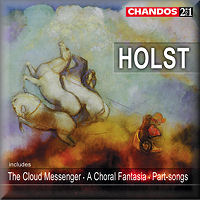 This
Cloud Messenger duo of reissues has been in circulation
since MusicWeb International first sprang into existence. Dr
Len Mullenger reviewed it in the early days. I felt it was
time to look at it again given the Hickox Legacy launch though
it forms no part of that series. The major Holst works here
are conducted by Hickox with City of London Sinfonia and London
Symphony Orchestra forces.
This
Cloud Messenger duo of reissues has been in circulation
since MusicWeb International first sprang into existence. Dr
Len Mullenger reviewed it in the early days. I felt it was
time to look at it again given the Hickox Legacy launch though
it forms no part of that series. The major Holst works here
are conducted by Hickox with City of London Sinfonia and London
Symphony Orchestra forces.
The Cloud Messenger is one of Holst's
Indian or Sanskrit works. Its language strikes some parallels
with a work from about a decade earlier: Bantock’s Omar
Khayyam. The Cloud Messenger was written just
before The Planets. It seems to have been benighted
by an imperfect premiere in one of Balfour Gardiner's
concerts at the Queen’s Hall. Holst was desperately discouraged
- he had conducted that premiere and the work soon sank away
becoming one of the composer's early horrors which he
virulently disavowed. Imogen Holst's critical condemnation
set the seal until a BBC performance in the 1960s by Peter
Gellhorn and then this recording in 1990.
In The Cloud Messenger a poet persuades a cloud to
carry his love message to his distant beloved in the Himalayas.
En route the cloud passes over the Ganges temple of
Shiva, the god of dance. It’s not a conventionally dramatic
or incident-rich tale.
The work’s lambent writing occasionally suggests a slow-blooming
ecstasy (tr. 2 6:16) but there’s opulence as well. This presumably
lies closer to the reported luxuriance of the opera Sita.
It’s certainly a world away from the minimalist beauties of
the Rig Veda choral hymns and the chamber opera Savitri.
Tr. 4 introduces us to a typical stolid yet satisfying trumpet-delineated
march of the type to appear in Ode to a Grecian Urn
in the Choral Symphony and in the Whitman-based Dirge
for Two Veterans. The first incidence of overt orientalism
appears in tr. 4 (2:12) with its glinting peaceable orchestration.
The piece ends in a Neptune-like glimmer, some suave
writing for the bass and pleasingly tense shimmering violins.
The Hymn of Jesus is accorded a stunning recording
catching wild and loud abandon as well as the recessed whispers.
Paul Spicer treats us to the lovely and moving (in both senses)
Ave Maria and finishes CD 1 with the chaste
The Evening Watch.
CD 2 start with the sweet ardour of the Seven Part Songs
for choir with orchestra H162 from the Joyful Company of Singers
conducted by Hickox. The feathery dancing of Sorrow and
Joy strikes an idiosyncratic mood. Patricia Rozario is
the successor to Janet Baker in her classic EMI recording of
A Choral Fantasia. This is a strange gaunt piece,
heavy with minatory brass and otherwise fading quickly to awe
and a sense of impending cataclysm. There’s something Havergal
Brian Gothic about it. A Dirge For Two Veterans
picks up again on one of Holst's idées fixes:
Walt Whitman. Here the CLS solo trumpet is excellent – slow-calling,
yet precise and honeyed in texture. There is nothing of Froissart
and bristling lances here, just a stolid funeral plod – veterans,
son and father, fallen together. Five years later, separated
by the four years of the Great War, Holst turned to Whitman
again and specifically to Leaves of Grass for The
Ode to Death. This work's resonances are obvious
enough - the slaughter of the Great War. It’s a succinct, plangent
and soothingly moving work and must be counted high in the Holst
oeuvre. How delightful was Holst’s gift in setting female voices
in large numbers. This can be placed alongside the excellence
of the Groves version of the Ode on EMI Classics. The
music ends in mystical tinkling and twangling: bells and starlight.
The delectably sung This I have done for my true love
and the four part-songs (1894-6) are among his earliest
works – smooth, capable and ingratiating. They make a conventionally
pleasing envoi to this fine CD double.
The excellent notes for this full value set are by the late
Christopher Palmer, by Lewis Foreman and Philip Reed. They are
in English only but unusually for Chandos the sung words are
not printed. You can however inspect them online and download
them in pdf format if you go to the Chandos site and search
under the original release numbers:-
http://www.chandos.net/pdf/CHAN%208901.pdf
http://www.chandos.net/pdf/CHAN%209437.pdf
http://www.chandos.net/pdf/CHAN%209425.pdf
The Cloud Messenger is also to be had separately at
full price with The Hymn of Jesus as CHAN 8901.
If this collection appeals then discard any passing reservations.
You will be pleased.
Rob Barnett
Detailed Track-Listings
Frank BRIDGE (1879-1941)
CD 1
Enter Spring, H 174 (1926-27) [18:36]
Isabella, H 78 (1907) [18:00]
Two Poems for Orchestra, H 118 (1915) [12:58]
Mid of the Night, H 30 (1903) [26:05]
[75:47]
CD 2
Dance Rhapsody, H 84 (1908) [19:16]
Five Entr'actes, H 95 (1910) [12:05]
Dance Poem, H 111 (1913) [13:48]
Norse Legend, H 60 (1905/1938) [4:48]
The Sea, H 100 (1910-11) [22:08]
[72:34]
CD 3
Coronation March, H 97 (1911) [6:49]
Summer, H 116 (1914-15) [10:42]
Phantasm, H 182 (1931) [24:21]
There Is a Willow Grows aslant a Brook, H 173 (1927) [11:19]
Vignettes de danse, H 166 (1938) [11:21]
Sir Roger de Coverley (A Christmas Dance), H 155 (1922) [4:41]
Howard Shelley (piano)
[69:51]
CD 4
Rebus, H 191 (1940) [10:44]
Oration (Concerto elegiaco), H 180 (1929-30) [29:17]
Allegro moderato, H 192 (1940-41) [13:24]
Lament, H 117 (1915) [5:19]
A Prayer, H 140 (1916-18) [17:55]
Alban Gerhardt (cello)
[77:01]
CD 5
Suite for Strings, H 93 (1909-10) [21:03]
The Hag, H 14 (1902) [2:25]
Two Songs of Robert Bridges, H 65 (1905-06) [6:32]
Two Intermezzi from 'Threads', H 151 (1921-1938)
[8:33]
Two Old English Songs, H 119 (1916) [7:30]
Two Entr'actes (1906, 1926) [6:38]
Valse Intermezzo a cordes, H 17 (1902) [6:49]
Todessehnsucht, H 181 (1932/1936) [3:53]
Sir Roger de Coverley (A Christmas Dance), H 155 (1922/1939)
[4:24]
Roderick Williams (baritone)
[68:17]
CD 6
Blow out, you bugles, H 132 (1918) [5:37]
Adoration, H 57 (1905/1918) [2:55]
Where she lies asleep, H 113 (1914) [3:01]
Love went a-riding, H 114 (1914) [1:40]
Thy hand in mine, H 124 (1917/1923) [2:10]
Berceuse, H 9 (1901) [5:06]
Mantle of blue, H 131 (1918/1934) [2:47]
Day after day, H 164i (1922) [4:55]
Speak to me, my love!, H 164ii (1924) [5:56]
Berceuse, H 8 (1901/1902/1928) [3:23]
Chant d'esperance, H 18ii (1902) [3:40]
Serenade, H 23 (1903) [2:51]
The Pageant of London, H 98 (1911) [15:08]
A Royal Night of Variety, H 184 (1934) [1:27]
Philip Langridge (tenor)
Sarah Connolly (mezzo)
[61:14]
BBC National Orchestra of Wales/Richard Hickox
rec. Brangwyn Hall, Swansea. 26-27 November 2000 (Vol. 1, Vol.
3 [Sir Roger de Coverley]), 19-20 September 2001 (Vol. 2), 28-29
November 2002 (Vol. 3 [other works]), 13-14 May 2003 (Vol. 4),
3-4 December 2003 (Vol. 5), 23-24 October 2004 Vol. 6)
CHANDOS CHAN 10729(6) X
=================
Ralph VAUGHAN WILLIAMS (1872-1958)
A Cotswold Romance - adapted by Maurice Jacobson in
collaboration with the composer, from Hugh the Drover [39:34]
Rosa Mannion (soprano) - Mary
Thomas Randle (tenor) - Hugh
Matthew Brook (baritone)
London Philharmonic Choir
Death of Tintagiles [14:48]
London Symphony Orchestra/Richard Hickox
rec. All Saints Church, Tooting, London, 3-4 October 1997
CHANDOS CHAN 10728 X [54:34]
========================
Herbert HOWELLS (1892-1983)
Hymnus Paradisi [46:42]
Joan Rodgers (soprano)
Anthony Rolfe Johnson (tenor)
A Kent Yeoman's Wooing Song† [18:21]
Joan Rodgers (soprano)
Alan Opie (baritone)
premiere recording
BBC Symphony Chorus
BBC Symphony Orchestra/Richard Hickox
rec. All Saints Church, Tooting, London, 2-4, 7 November 1998
CHANDOS CHAN 10727 X [65:12]
==================
Gustav HOLST (1874-1934)
Suite de ballet, Op. 10 [19:24]
A Song of the Night, Op. 19 No. 1 [8:31]
Lesley Hatfield (violin)
The Wandering Scholar, Op. 50 [25:24]
Ingrid Attrot (soprano) - Alison
Neill Archer (tenor) - Pierre
Alan Opie (baritone) - Louis
Donald Maxwell (bass) - Father Philippe
Northern Sinfonia/Richard Hickox
rec. St Nicolas Hospital, Gosforth 15-16 May 1996
CHANDOS CHAN 10725 X [53:40]
======================
Edward ELGAR (1857-1934)
The Light of Life, Op 29 [62:48]
Judith Howarth (soprano) (The Mother of the Blind Man)
Linda Finnie (contralto) (Narrator)
Arthur Davies (tenor) (The Blind Man)
John Shirley-Quirk (baritone) (Jesus)
London Symphony Chorus
London Symphony Orchestra/Richard Hickox
rec. All Saints Church, Tooting, London, 1-3 February 1993
CHANDOS CHAN 10726 X [62:48]
============================
George DYSON (1883-1964)
CD 1
Overture: At the Tabard Inn [11:41]
The Canterbury Pilgrims [90:55] (cont)
CD 2
In Honour of The City of London [15:08]
Yvonne Kenny (soprano)
Robert Tear (tenor)
Stephen Roberts (bass)
London Symphony Chorus
London Symphony Orchestra/Richard Hickox
rec. Blackheath Halls, London 30 September and 1, 4-5 October
1996
CHANDOS CHAN 241-43 [57:25 + 60:42]
John TAVENER (b. 1944)
CD 1
We Shall See Him As He Is - Ikon of the Beloved (1990)
[61:08]
John Senter (cello)
Patricia Rozario (soprano)
John Mark Ainsley (tenor)
Andrew Murgatroyd (tenor)
BBC Welsh Chorus
Britten Singers
Chester Festival Chorus
BBC Welsh Symphony Orchestra/Richard Hickox
CD 2
Eis Thanaton - a Ritual - Sung in Greek (1986) [37:50]
Patricia Rozario (soprano)
Stephen Richardson (bass)
City of London Sinfonia/Richard Hickox
Theophany for pre-recorded tape and orchestra (1992-93)
29:03
Jeremy Birchall all male voices, including 'Adam'
solo
Margaret Feaviour 'Eve' solo
Bournemouth Symphony Orchestra/Richard Hickox
rec. Royal Albert Hall, London, 23 July 1992 (We Shall See Him
As He Is); Blackheath Concert Halls, London, 4 February 1994
(Eis Thanaton); Wessex Hall, Poole Arts Centre, 5 May 1994 (Theophany)
CHANDOS CHAN 241-42 [61:08 + 67:06]
Gustav HOLST (1874-1934)
CD 1
The Cloud Messenger, H111* [43:11]
The Hymn of Jesus, H140 [22:24]
Della Jones (mezzo)*
London Symphony Chorus
London Symphony Orchestra/Richard Hickox
Ave Maria, H49 [3:48]
The Evening-watch, H159 [4:37]
Susanna Spicer (alto solo) - Mark Milhofer (tenor solo)
Finzi Singers/Paul Spicer
CD 2
Seven Part-songs, H162* [23:05]
A Choral Fantasia, H177* [16:42]
A Dirge for Two Veterans, H121 [6:31]
Ode to Death, H144 [12:27]
Patricia Rozario (soprano)*
Joyful Company of Singers
London Symphony Chorus
City of London Sinfonia/Richard Hickox
This have I done for my true love, H128 [5:48]
Rachel Wheatley (soprano solo)
Four Part-songs [7:36]
Finzi Singers/Paul Spicer
rec. St Jude on the Hill, Hampstead, London; 4-5, 9 June 1990
(The Cloud Messenger; The Hymn of Jesus); St Silas The Martyr,
Kentish Town, London 25-26 March 1993 (Ave Maria, The Evening-watch,
This I have done for my true love; Four Part-songs); All Saints
Church, Tooting, London 3, 5 September 1994 (other works)
CHANDOS CHAN 241-6 [74:22 + 72:44]




 All Nimbus reviews
All Nimbus reviews








